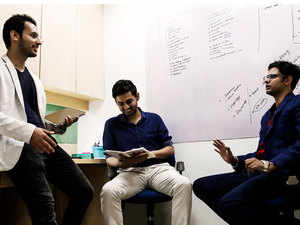 Others
OthersThe alarming levels of pollution hazards in the country can also be gauged from a WHO report published last year. Indian cities dominated the findings with 9 out of the 10 most polluted cities in the world being from India! Kanpur topped the list of the world’s most polluted cities while Delhi stood at the sixth spot with PM 2.5 levels of 143.
In this backdrop, Nanoclean, which used nanotechnology and created nasofilters to make clean air a priority for city dwellers created a strong niche for itself in the market. Billed as a company which offers solutions to curb pollution and promote better health, their products boast of being high on the tech and design quotient. Founded by IIT grads Prateek Sharma, Tushar Vyas and Jatin Kewlani in February 2017, the nasofilters - which can be worn externally on the nose - help to prevent pollutants from seeping in.
“We had this idea that an insertion technique will irritate the user and can also destroy natural hair, but one can make it into an external device instead for better comfort,” says Kewlani, COO of Nanoclean who oversees the sales and production aspects of the company.
In this, he says, the nose is in immediate contact so even if one feels slight breathing resistance; it will be felt far more since the surface area is less. “The breathing resistance of this will be much lesser than a normal mask. 0 - 4 millibar breathing resistance is allowed in masks. 0.6 millibar is the breathing resistance in these units and they can easily be worn for up to 12 hours,” he adds.
But there were design-led bottlenecks that they experienced initially. Finalising the medical tape took its own time, effort and resources. “We had to be careful with the tape since it comes in close contact with the skin for a user. So just in zeroing in on the tape, it amounted to expenses of Rs 15 lakh. First we tried to procure it from China but one has to do bulk purchases there and that was costing us too much. So we tried different places at different amounts. Finally we settled on 3M in India and have a contract with them now,” reveals Kewlani.
These are priced at a very affordable cost of Rs 10 per unit which, Kewlani explains, was a conscious strategy even though a similar product in the US would be no less than Rs 100. “In India, it is a question of scale. We kept lower margins since we wanted to sell this product in volumes. We can also raise the price and sell it for Rs 20 but then our volumes will also go down by half. Consumption won’t be as much as it is now,” he says.
Moreover, labour and manufacturing facilities are cheaper in India as compared to the US where in-house facilities are expensive. “The pricing strategy in US is positioned that way - there are a lot of pollen allergies in US, so it is made keeping that in mind,” he avers.
 Others
OthersNano miracle
Initially, the trio was clueless on how to take the idea forward. Tushar had vaguely heard of nanofiber technology and set up a meeting with Ramgopal Rao, Director at IIT Delhi, who had his own lab of the technology in IIT Mumbai. Rao asked them to meet the professor from the Textile Department.
The meeting with the professor got delayed due to the latter’s packed schedule but, as luck would have it, the professor’s wife who was asthmatic chanced upon the product samples and recommended their use. Kewlani can’t help suppress a smile when he recalls how their top team was built, thanks to many such ‘chance’ encounters. “Our entire head level team was made this way. Both the professors came on board after using the product. Ashwani sir’s wife was asthmatic. Our investor, Sanjeev Jain, has his own hospital - he gave some samples of the product to his doctors who used it and said it’s a very good product,” he reminisces.
Their first round of private investment came via seed funding from IIT Delhi alumnus Sanjeev Jain. Investment received from the government so far has been to the tune of Rs 55 lakh, with a total commitment of Rs 85 lakh promised under the different schemes.
They are now raising their next round, a pre-series A funding, with a pool of investors and the plan is to have a final round of fundraising to develop their own manufacturing facility. At present, their manufacturing is done at a facility in Ahmedabad and Noida.
Aggressive plans lined up
The company has been seeing a robust demand since the time it started operations in the country. While, in the peak season, sales hover between 20 - 30 lakh units per month, in the off season which is from May - August, it is around 2-3 lakh units.
Delhi NCR, Bangalore and Mumbai are in the lineup as the three main cities where major demand for nasofilters currently comes from, with Delhi NCR seeing the maximum demand at 70% followed by Bangalore and then Mumbai.
Their target in the next financial year is Rs 50-60 crore. “This is the targeted revenue since next year we will be focused on setting up of the manufacturing facility which we plan to do on a grand scale. After that, we foresee that we will be making this company into an IPO in the next three years. People find that quite unrealistic but we will do it,” Kewlani says confidently.
A plan to ramp up their export vertical during the off season is in the pipeline. Moreover, they are also keen to diversify their portfolio to include other cutting edge products in the health and cosmetics space which will help them be in a differentiated space as innovators. “The pipeline of products that we have planned, which I cannot reveal right now, will be game changing products. They will completely disrupt the market,” he highlights, the enthusiasm brimming in his eyes.
Kewlani is of the view that certain nuances can come in handy as an entrepreneur. Too much optimism early on, he feels, can act more as a disadvantage. “At times, the feeling that one can conquer it all may be too misplaced. At the starting level, it is very important to have someone who says No. One should hear “no’s” more often,” he adds emphatically.











 Get Unlimited Access to The Economic Times
Get Unlimited Access to The Economic Times
